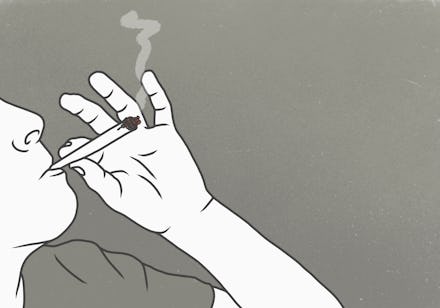If you're self-medicating with weed, here's what you need to know

There’s been an increase in cannabis use during the past decade now that the legal landscape is shifting, but new research suggests that one demographic in particular is smoking more weed: people managing depression. I’m no scientist, but I can easily assume that people who are depressed may want to smoke weed to alleviate their symptoms — after all, the high tends to be euphoric and chill for most. But is self-medicating this way a good thing? While cannabis has a lower risk of addiction (and fewer side effects) than some prescription meds used to treat depression, there are dangers that come along with self-treating. Here’s what you should know about weed and depression.
I asked Dmitry Ostrovsky, a Brooklyn-based psychiatrist and professor in the department of psychiatry at the Icahn School of Medicine at Mount Sinai, to explain this weed study to me in kindergarten terms. He tells me, first off, that the perceived risks of smoking weed are decreasing faster in depressed populations. This means that depressed people may not know the risks of smoking weed, or might perceive them as less harmful than they actually might be.
“I think that the messaging surrounding cannabis in our current zeitgeist is overly optimistic and dangerously disingenuous,” says Ostrovsky. “Increasing education about the potential downsides of cannabis use in the depressed population would be helpful.” Basically, people with depression — and folks who love them — should know that weed may not help their depression.
It feels natural and beneficial to self-medicate with weed for a lot of people but it can be tricky if they're not getting guidance from a professional. “While it has recreational utility for many and some possible psychiatric benefit to a few, cannabis also has side effects,” says Ostrovsky. “Unfortunately, the dangers have been grossly downplayed by advocates for legalization.” In other words, while some people may experience mental health benefits, others will not. And people who are depressed may be more vulnerable to the side effects of smoking weed, and some of us get so stoked about getting 420 on shelves that we aren’t talking about the potential dangers.
“Cannabis use, especially heavy use, has very real consequences for people struggling with mental illness,” Ostrovsky says. “It [can] worsen psychosis, precipitate mania, worsen panic disorder, and prolong depression. This can happen when cannabis is interfering with the medications used to treat these illnesses or even by worsening them via its own effects.” So all the things that suck about having depression can be exacerbated by weed.
Still, it’s important to know that no one is saying weed is bad. But if we’re all serious about its legalization, we need to stop trying to pretend that weed is a glowing miracle cure. That line of argument is preventing people who are dealing with mental illness from being properly educated.
Cannabis has not been found to doesn’t seem to cause depression, but we don’t know for sure if it will help, either. Ostrovsky sees the publicity around this new research as a step in the right direction: increased funding for educating vulnerable populations and making sure that cannabis used for medical purposes is appropriately labeled and administered.